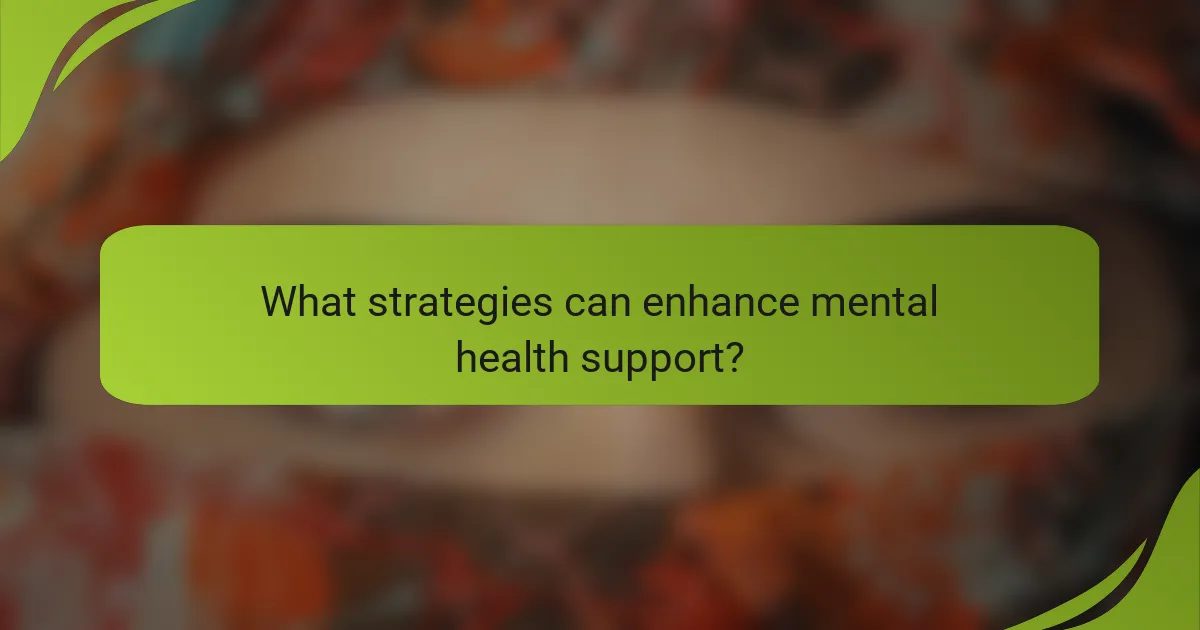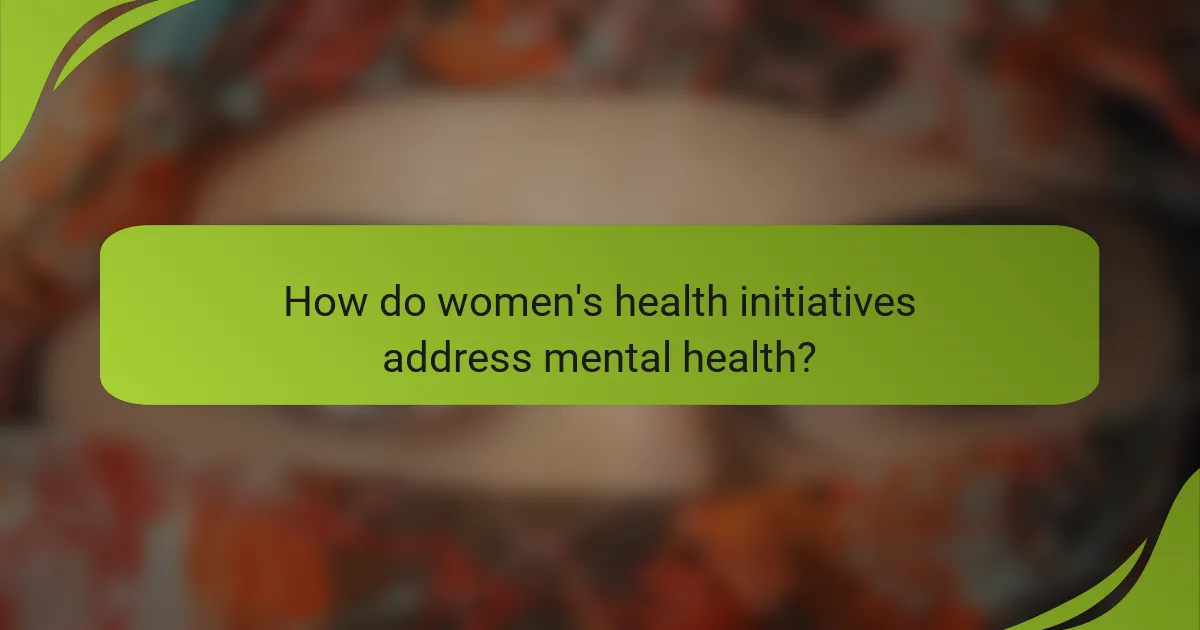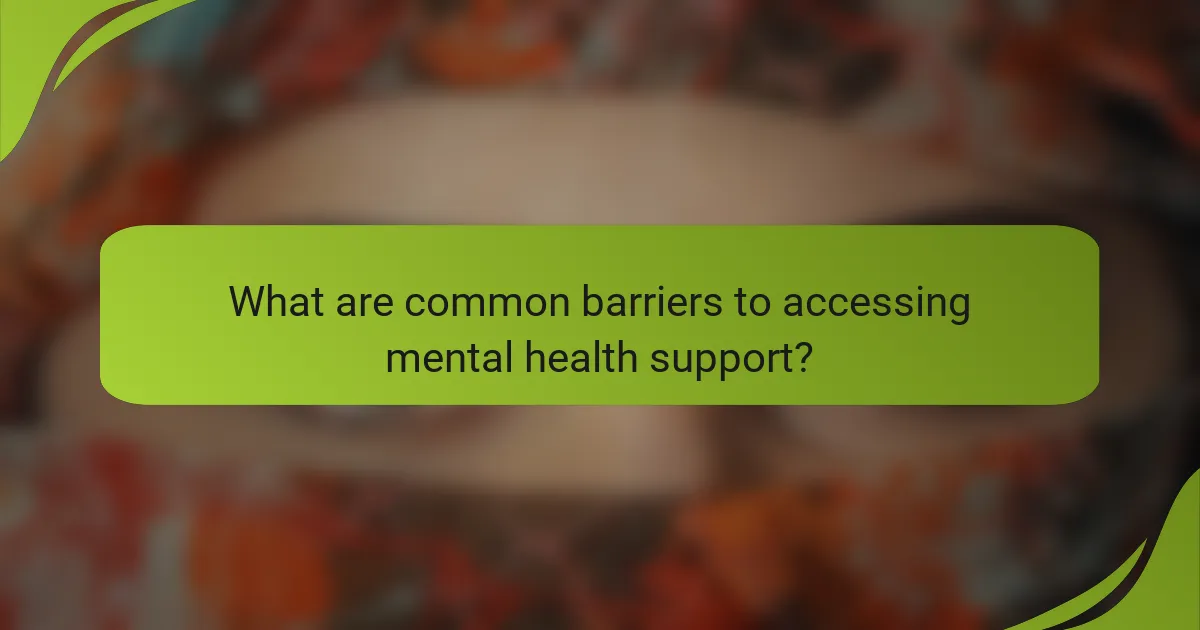Mental health support is essential for women, offering benefits such as improved emotional stability and stronger social connections. By implementing effective strategies like therapeutic interventions and mindfulness practices, women can enhance their emotional well-being and resilience. Additionally, targeted women’s health initiatives play a vital role in addressing mental health needs, ensuring access to resources and advocating for necessary policy changes.

What are the benefits of mental health support for women?
Mental health support offers women numerous benefits, including improved emotional stability, enhanced coping mechanisms, and stronger social networks. These advantages contribute to overall well-being and can lead to better health outcomes in various aspects of life.
Improved emotional well-being
Access to mental health support can significantly enhance emotional well-being for women. Therapy and counseling provide safe spaces to express feelings, process experiences, and develop healthier thought patterns. This support can lead to reduced symptoms of anxiety and depression, fostering a more positive outlook on life.
Women often face unique stressors, such as balancing work and family responsibilities. Mental health resources can help manage these pressures, leading to greater emotional balance and satisfaction.
Enhanced coping strategies
Effective mental health support equips women with coping strategies to handle stress and adversity. Techniques such as mindfulness, cognitive-behavioral strategies, and problem-solving skills can be learned through therapy. These tools empower women to navigate challenges more effectively and maintain emotional stability.
Additionally, support groups can provide shared experiences and practical advice, further enhancing coping skills through community learning.
Increased resilience
Mental health support fosters resilience, enabling women to bounce back from setbacks. By developing a deeper understanding of their emotions and behaviors, women can cultivate a mindset that embraces challenges as opportunities for growth. This resilience is crucial in both personal and professional spheres.
Participating in workshops or therapy can help build this resilience by teaching women how to reframe negative thoughts and focus on solutions rather than problems.
Better physical health outcomes
There is a strong link between mental health and physical health, particularly for women. Mental health support can lead to healthier lifestyle choices, such as improved nutrition and regular exercise, which are essential for overall well-being. Women who engage in mental health services often report better management of chronic conditions.
Moreover, addressing mental health can reduce the risk of stress-related illnesses, leading to lower healthcare costs and improved quality of life.
Stronger social connections
Engaging in mental health support can strengthen social connections for women. Therapy and support groups create opportunities for women to meet others facing similar challenges, fostering a sense of belonging and community. These connections can alleviate feelings of isolation and enhance emotional support systems.
Building strong relationships through shared experiences can lead to lasting friendships and networks that provide ongoing support in times of need.

What strategies can enhance mental health support?
Strategies that enhance mental health support include therapeutic interventions, mindfulness practices, community resources, and self-care routines. These approaches can significantly improve emotional well-being and resilience, making it easier to cope with life’s challenges.
Therapeutic interventions
Therapeutic interventions, such as cognitive-behavioral therapy (CBT) or dialectical behavior therapy (DBT), provide structured support for individuals facing mental health issues. These therapies focus on changing negative thought patterns and developing coping strategies, often leading to improved mental health outcomes.
Consider seeking a licensed therapist who specializes in your area of concern. Many health insurance plans cover therapy sessions, making it more accessible. Regular sessions, typically weekly or bi-weekly, can help maintain progress and provide ongoing support.
Mindfulness and meditation practices
Mindfulness and meditation practices promote mental health by encouraging present-moment awareness and reducing stress. Techniques such as guided meditation, deep breathing exercises, and yoga can help individuals manage anxiety and improve emotional regulation.
Start with short sessions, around 5-10 minutes daily, and gradually increase the duration as you become more comfortable. Many apps and online resources offer guided sessions tailored to different needs, making it easy to incorporate these practices into your routine.
Support groups and community resources
Support groups and community resources provide a platform for individuals to share experiences and receive encouragement from others facing similar challenges. These groups can be found through local mental health organizations, hospitals, or online platforms.
Participating in a support group can enhance feelings of belonging and reduce isolation. Look for groups that focus on specific issues, such as depression or anxiety, and consider both in-person and virtual options to find what works best for you.
Self-care routines
Self-care routines are essential for maintaining mental health and well-being. Engaging in regular physical activity, maintaining a balanced diet, and ensuring adequate sleep can significantly impact your mood and stress levels.
Establish a daily routine that includes time for relaxation and hobbies. Simple practices like journaling, taking walks, or enjoying a warm bath can enhance your mental state. Aim to dedicate at least 30 minutes each day to activities that bring you joy and relaxation.

How do women’s health initiatives address mental health?
Women’s health initiatives play a crucial role in addressing mental health by providing targeted support and resources tailored to women’s unique experiences. These initiatives focus on improving access to mental health services, advocating for policy changes, and raising awareness about mental health issues affecting women.
Access to specialized programs
Specialized programs for women’s mental health often include services such as counseling, support groups, and therapy tailored to women’s specific needs. These programs may address issues like postpartum depression, anxiety related to reproductive health, and trauma from gender-based violence.
Access to these programs can vary by region, with urban areas typically offering more options than rural locations. Women should seek out local health departments or community organizations that provide information on available resources.
Policy advocacy for mental health
Policy advocacy is essential for improving mental health services for women. Initiatives often work to influence legislation that supports funding for mental health programs and ensures equitable access to care. This can include lobbying for mental health parity laws that require insurance companies to cover mental health services at the same level as physical health services.
Engaging in advocacy efforts can empower women to voice their needs and influence change. Joining local advocacy groups can provide a platform for women to connect with others and amplify their concerns regarding mental health policies.
Education and awareness campaigns
Education and awareness campaigns aim to destigmatize mental health issues and inform women about available resources. These campaigns often utilize social media, workshops, and community events to reach a broader audience and promote understanding of mental health challenges.
Women can benefit from participating in these initiatives by gaining knowledge about mental health and learning how to seek help. Community organizations often provide materials and training that equip women with the tools to support themselves and others facing mental health challenges.

What role do healthcare providers play in mental health support?
Healthcare providers are essential in identifying and addressing mental health issues, offering initial support, and guiding patients toward appropriate resources. They play a pivotal role in screening, assessment, and connecting individuals with specialized care when needed.
Screening and assessment
Healthcare providers conduct screenings to identify mental health conditions early. This often involves standardized questionnaires and interviews that assess symptoms and their impact on daily life. Regular screenings can help catch issues before they escalate, particularly in primary care settings.
Providers should be aware of common mental health disorders, such as depression and anxiety, and use validated tools to ensure accurate assessments. For example, the Patient Health Questionnaire (PHQ-9) is frequently used to evaluate depression severity.
Referral to mental health specialists
When a healthcare provider identifies a mental health concern, they may refer the patient to a mental health specialist, such as a psychologist or psychiatrist. This referral is crucial for individuals requiring more intensive therapy or medication management.
Providers should ensure that referrals are based on the patient’s specific needs and preferences, considering factors like location, specialty, and insurance coverage. Clear communication about the referral process can help patients feel more comfortable seeking specialized care.
Collaboration with community resources
Healthcare providers often collaborate with community resources to enhance mental health support. This can include partnerships with local mental health organizations, support groups, and crisis intervention services. Such collaborations can provide patients with additional resources and support systems.
Providers should be familiar with available community resources and actively refer patients to these services when appropriate. This might include local hotlines, counseling centers, or wellness programs that can further assist individuals in managing their mental health effectively.

What are common barriers to accessing mental health support?
Common barriers to accessing mental health support include stigma, lack of awareness, and financial constraints. These obstacles can prevent individuals from seeking the help they need, impacting their overall well-being.
Stigma and discrimination
Stigma surrounding mental health can deter individuals from seeking support due to fear of judgment or discrimination. Many people worry about how they will be perceived by family, friends, or employers if they disclose their mental health struggles.
Discrimination can manifest in various forms, including social exclusion or negative stereotypes. This can create a cycle where individuals avoid seeking help, further exacerbating their mental health issues.
Lack of awareness and education
A significant barrier to accessing mental health support is the lack of awareness about available resources and the importance of mental health. Many individuals may not recognize the signs of mental health issues or understand that help is accessible.
Educational initiatives can play a crucial role in addressing this gap. By providing information about mental health conditions and available treatments, communities can empower individuals to seek assistance when needed.
Financial constraints
Financial barriers often prevent individuals from accessing mental health services. Many people may not have insurance that covers mental health care, or they may face high out-of-pocket costs for therapy and medications.
In some regions, public mental health services may be limited or underfunded, leading to long wait times or inadequate support. Exploring sliding scale options, community resources, or government programs can help alleviate some of these financial burdens.


